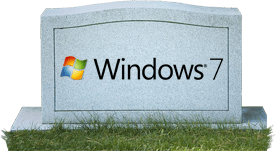Windows 7 reaches its End of Life phase on January 14, 2020, which means Microsoft will stop releasing updates and patches for the operating system.
It also means Microsoft likely won’t offer help or support when you’ll inevitably encounter problems.

This doesn’t mean Windows 7 will stop working on January 14, 2020 – you’ll still be able to use Windows 7. However, just because you can use Windows 7 in its End of Life status, doesn’t mean you should. Continuing to use Windows 7 after January 14, 2020 not only puts your entire office network at risk, it also means your company is no longer HIPAA and/or PCI compliant.
The main issue with using Windows 7 is that it won’t be patched or supported, and this leaves you extremely vulnerable to any new and ongoing threats.
Even more, if a large number of people continue to use Windows 7 after the End of Life date; that could be a large motivation for malicious hackers to target Windows 7.
While Windows 7 will continue to function after January 14th 2020, you should start planning to upgrade to Windows 10, as soon as possible. Especially if you have multiple computers running Windows 7. Continuing to use Windows 7 after January 14, 2020 not only puts your entire office network at risk, it also means your company is no longer HIPAA and/or PCI compliant.
Also, while Microsoft has done a great job of making Windows 10 run on older hardware, it’s still a newer operating system that might struggle to work well on your old Windows 7 computer.
The rule of thumb is that if your computer is over 4 years old, you should replace it as opposed to upgrading to Windows 10.
